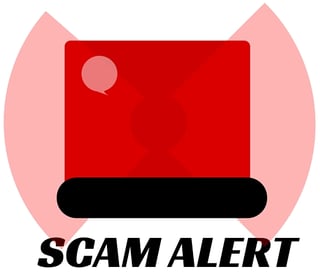Late spring and early summer mark the beginning of vacations for many people.  However, while you are relaxing poolside, fraudsters are working hard to snatch your money. Here are four scams to beware during these vacationing months.
However, while you are relaxing poolside, fraudsters are working hard to snatch your money. Here are four scams to beware during these vacationing months.
Phishing for a Plane Ticket
Have you ever received an email to confirm a purchase you made online? The same principle applies, except you never reserved a flight. Con artists create realistic email confirmations with an airline’s logo, PDF attachments, and links claiming to take you to the airline’s help desk or home page. You may be inclined to select one of the links or attachments to try to figure out this obvious error. However, once the link or attachment is clicked, malware infiltrates your computer and can gather personal or financial information. If you are concerned about a suspicious email, directly contact your airline. Delta Air Lines, for example, has a page on their website dedicated to combating phishing emails.
Beast of Burden
You aren’t a mule, but you could sure feel like one if you get caught in this scam. Recently, drug traffickers abroad have been reaching out to older adults (usually in the U.S.) by proposing wealth, romance, etc. The trafficker then offers to meet with the older adult but only if the older adult comes to them via plane, which the trafficker will pay for. While the older adult waits during a layover, their new lover or business partner asks them to pick up an innocuous package or suitcase and bring it with them on their flight. The suitcase or package is stuffed with drugs and the older adult could be arrested for trying to smuggle narcotics on the plane. According to AARP, drugs can be hidden in common items, such as hangers, shoes, picture frames or boxed candy.
Dude, Where’s My Wallet?
If you keep your wallet in a pocket or purse, pay close attention. Pickpockets scout tourist attractions looking for an easy mark. It could be as simple as the thief swiping your wallet from your back pocket or as complex as a two-person job, where one distracts you while the other plucks your wallet from your purse. Here are some tips from How Stuff Works on how to protect yourself:
- Use a money belt
- Bring along a decoy wallet
- Act confident even if you are in a foreign country
- Avoid purses, backpacks and fanny packs
Take-Out, Fake-Out
You arrive at your hotel room tired and ravenous after traveling. You spot a flier for a local pizza place slipped under your door and place an order. Unbeknownst to you, this will be the most expensive pizza you never got to eat. Con artists stick phony restaurant fliers or menus in or near hotel rooms, hoping people will call the number and use their credit card to place the order. In the end, the scammers have your account information and you are left hungry and out of money! If you are unsure of a delivery place’s legitimacy, call the front desk of your hotel or resort. The clerk can verify whether the restaurant is real or provide another recommendation. Always pay the delivery person in cash after they give you your order.
If any of these sound familiar to you or your loved one, please seek help. Call your bank if money was taken from your account, notify the local police and contact the National Consumers League’s fraud program at http://www.fraud.org or 1-800-876-7060. You can also submit a report and receive a recovery plan from the Federal Trade Commission's website at https://identitytheft.gov/. Follow our blog for more information on scams.
![Duel-Logo-CFC-AYS[rgb]](https://blog.comforcare.com/hs-fs/hubfs/Duel-Logo-CFC-AYS%5Brgb%5D.jpg?width=525&name=Duel-Logo-CFC-AYS%5Brgb%5D.jpg)